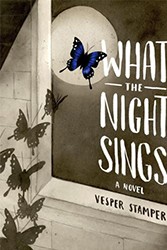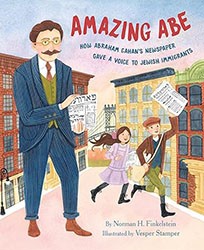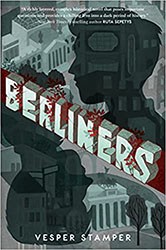
Vesper Stamper is the author and illustrator of What the Night Sings. She is blogging here as part of Jewish Book Council’s Visiting Scribe series.
My grandparents were my first and most important musical influences. My grandfather was always singing, doing little jigs around the house. He had a rich baritone that I can still hear now, even fifteen years after cancer took his voice out of the world. My grandmother, too, was a very forward alto who could (magically, to a little girl) whistle through her teeth. WQXR, the classical station in New York, was always on in their house. When I was far younger than you’d expect a little kid to sit still, my grandfather would take me to see the New York Philharmonic. I was mesmerized by the music, and the spell never left me. My childhood was quite troubled, but my grandparents were a salvific presence, and so was their music. Music, for me, has always been associated with hope.
I attended LaGuardia High School of the Arts in Manhattan, where I was positively immersed in classical music, not from some distant stage, but from my fellow teenaged friends, in the hallways and classrooms. Even though I was an art major, I managed to sneak into the Senior and Gospel Choirs. I couldn’t imagine doing only art and not music. I doubled down on my very lousy piano playing, teaching myself some satisfying Bach, Beethoven and Mozart pieces — for my own enjoyment, never for an audience. At fifteen, I picked up the guitar and never looked back, going on to become a touring and recording singer-songwriter alongside my career as an illustrator.
I’m not sure when the character of Gerta first revealed herself to me as a musician, but she had to be a singer, a lover of the great German-language operatic tradition that stemmed from Hildegard von Bingen (whose 12th century Ordo Virtuum could, some argue, be considered the first opera), flowed through Bach’s heavenly oratorios, and blossomed into Mozart’s masterpieces and beyond. Before she and her father are deported from the musical town of Würzburg, Gerta does not know she is Jewish. Thanks to an elaborate and necessary ruse by her father, she believes herself to be thoroughly German, and is preparing for her operatic debut, the aria Erbarme Dich from Bach’s St. Matthew Passion.
A complex and lengthy work, the St. Matthew Passion is full of pathos and tragedy. It recounts, in both narrative detail and reflective mediation, the last hours of the life of Jesus. What strikes me about the meditative movements within St. Matthew is that they do not directly reflect the story, but are expressions of grief and loss that stand on their own and apply to all of us.
The St. Matthew Passion begins with the words Kommt, ihr Tröchter, helft mir klagen: “Come, O daughters, help me lament.” Even several years since I began work on What the Night Sings, I cannot get through the first measure of that chorale without weeping. The story of the Passion, after all, is a closeup on the story of the ancient Roman persecution of the Jewish people — one of many catalytic events that culminated in the fall of Jerusalem, resulting in the Diaspora to Europe. The Diaspora has been characterized, as I point out in the book, by roughly 70 – 100 year cycles of Jewish persecution, right up to the present day. It is a reality we have not been able to shed in two thousand years.
One of the many things that punctuates the insanity of the Holocaust is the fact that the same German culture that gave us Bach and Schumann also produced the gas chambers and Mengele. It was important to me, therefore, to juxtapose the greatness of Bach with the depravity of Auschwitz, and to have that serve as a mirror to Gerta’s struggle with her own recently discovered Jewish identity, and her reemergence into herself as a woman of agency, a young adult, and an artist. She wrestles with the subject of her identity throughout the book. The fact is that within each of us lies this tension. The human being is itself a paradox — created in the image of God and therefore imbued with great dignity and capacity for goodness, yet easily tempted toward self-interest, tribalism, and evil. This echoes historian Aleksandr Solzhenitsyn’s assertion in The Gulag Archipelago that “the line dividing good and evil cuts through the heart of every human being.”
Music is a transcendent force. It can be hijacked for propaganda; it can be painfully associative. But it can be potent in its ability to heal, to lift people out of the hell they may be experiencing at that very moment, if only for a moment. Music exists, in a sense, in a reality above good and evil. As Anita Lasker-Wallfisch, a cellist in the Auschwitz Women’s Orchestra, says in this interview: “[Mengele]…did not spoil Schumann or the Träumerei for me.”
Vesper Stamper is an author/illustrator living in the Northeast with her husband filmmaker Ben Stamper,and her two children. She has an MFA in Illustration as Visual Essay from School of Visual Arts NYC. Follow her on Instagram and Facebook @vesperillustration.



